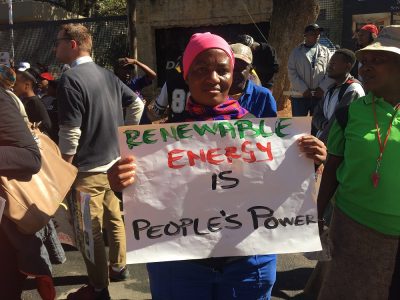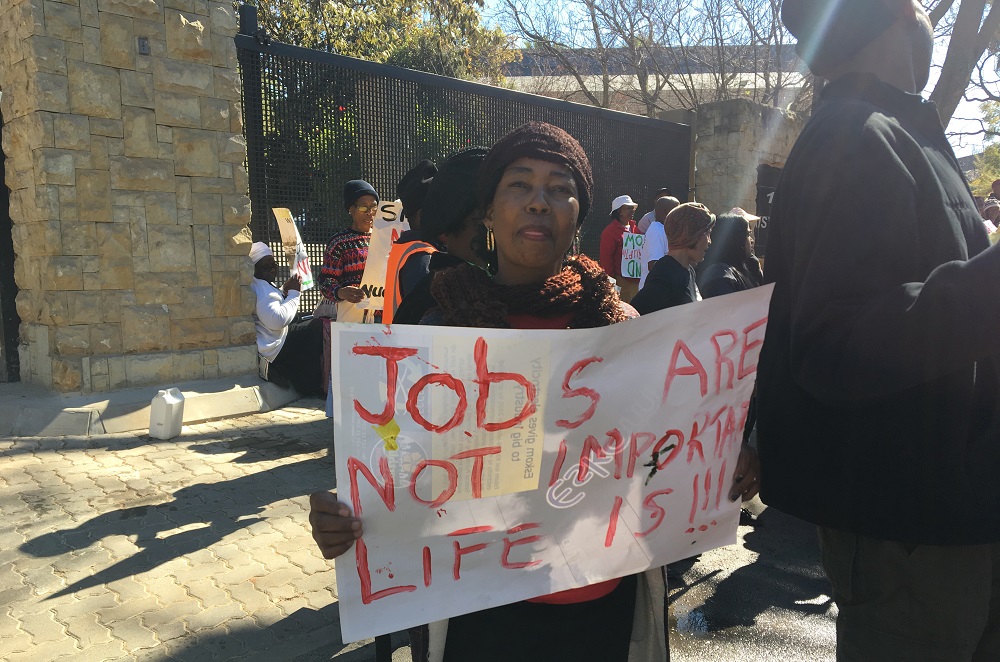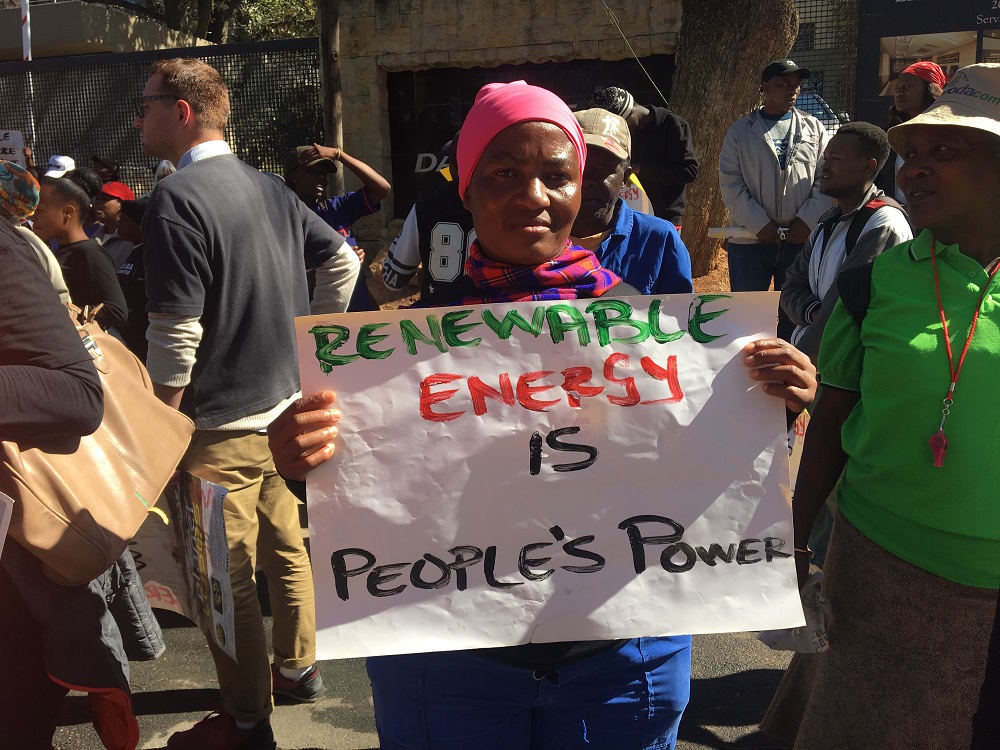Activists in South Africa Raise Their Voices Against BRICS

Note to readers: please click the share buttons above. Forward this article to your email lists. Crosspost on your blog site, internet forums. etc.
Amid the backdrop of the beginning of the 10th BRICS (Brazil, Russia, India, China and South Africa) Summit, activists and community organisations held a picket outside the New Development Bank. The Summit kicked off with an address from President Cyril Ramaphosa and other leaders from the bloc. However, prior to the opening addresses, various activists, trade unionists and feminists picketed against what the bloc means. The Daily Vox team was there.
Activists in particular protested against the recent Chinese billion dollar loan to Eskom. The loan has been hailed about being the bailout that South Africa’s electricity parastatal desperately needs.
However, activists says there needs to be questions asked about the loan repayment.
The activists gathered raised concerns about how the repression being faced in other BRICS member countries could be translated to South Africa.
Bandile Mdlalose from the Civil Brics Steering community and Brics From Below coalition told The Daily Vox that:
“The plan is to boycott and protest against the New Development Bank. Part of the reason is because the bank continue putting money into Transnet and Eskom, the very same companies that people do not want because of what they do in their communities. We are here to say the New Development Bank should support communities instead of putting money into corrupt companies that are affecting communities,”
Mdlalose says they cannot support things that affect communities and their health. The rally had different community movements from Durban, Johannesburg and Soweto.
“One: they do not care about South Africa, they do not care about people so this is just a bunch of criminals meeting to decide how they are going to exploit the mineral resources, how they are going to exploit the people,” says Mdlalose about the Brics Summit.

Trevor Ngwane from the Break the Brics Coalition and United Front-Joburg will be leading an action on Thursday. The point of the action is to raise awareness with the media and the public against the environmentally destructive policies of the Brics countries.
“We are also against their undemocratic policies for example India is illegally occupying Kashmir and Putin is an unelected dictator. We are against all these economies and what they are doing,” says Ngwenya.
He says the group undermines worker rights and is not working for the people.
“Our own president in South Africa, Ramaphosa was found connected to the murder of 35 miners who were fighting for a living wage in Marikana,” Ngwenya says.

Desmond D’sa Coordinator of the South Durban Community Environmental Alliance said the point of the picket was about those at the Convention Centre who they don’t have access to about how they are making policies that will be environmentally damaging and harm communities.
D’sa says the Brics institutions are no different from neoliberal organisations like the World Bank and the International Monetary Fund.
“The destruction is far and wide throughout the African continent […] The Brics countries have been destructive, looting the resources of the continent and leaving people in abject poverty. We cannot promote the Brics because it is another form of sub-imperialism. It is promoting the capitalist system which has failed people all around the world,” D’sa says.
Regarding the Eskom deal that was signed D’sa says it is just going to leave more people disconnected as the loan will have to be paid back, meaning tariffs are going to increase. He says Ramaphosa has sold out the people of South Africa through this deal.

Makoma Lekalakala from Earthlife Africa says they are concerned that this bank is so different from other banks like the World Bank and the IMF. She says the bank has given money to Transnet and Eskom without following due diligence processes.
“We are concerned that it is a New Destruction Bank […] We are worried that the bank launching in South Africa will mean it will be all across Africa,” says Lekalakala, bringing with it corruption.
She says they are worried about the issue of repression following when these loans are given especially those targeting human rights and environmental activists.
“The summit itself is a summit of heads of countries where there is overt and covert repression in Russia, China, India and Brazil. In South Africa, it might not be overt but I think activists are just worried that Brics is a perpetuation of human rights violations and killing of activists,” Lekalakala says.

Priya Dharshini, a researcher at the Centre for Financial Accountability in New Delhi, said the Brics bank is seen as a new development bank that is going to challenge the hegemony of the World Bank but looking at its functions shows that they are the same.
“It doesn’t challenge the hegemony of the West or of these development banks, says Dharshini adding that these banks have taken the baton in furthering inequality and corporate loot.
“Irrespective of where we come from, we are oppressed by the same people and our problems whether it is land grab or land displacement or here the people are fighting against Eskom…” she said regarding the shared oppressions in the Brics countries.
The head of the Development Bank, K.V Kanuth is from India and someone Dharshini has encountered.
She says he was handpicked by the Modi government to lead the bank and he was instrumental in privatising Indian developmental banks.
“Especially when the monopoly capital hails him a man to be reckoned with and afraid […] him heading NDP is something we really to look at it more critically,” she says.
On the importance of global solidarity movements, Dharshini says:
“One thing that globalisation has done is also kind of globalised oppression of the same people who are doing the same kind of destructive development in one country and another country and they are all together […] and as people who are fighting against these things and fighting for alternative form of development which is more just and inclusive of all people, I think we also need to come together,”
Ilya Matveev from Openleft.ru, was one of the speakers at the Wits teach-in. Matveev says Russia which models itself on the platform of an alternative to the neoliberal system but in fact that it is all rhetoric.
“Russia poses as a kind of alternative to the West but in reality it is not an alternative to West as the same practises are mirrored in Russia. Through the teach-ins, I realised it’s more or less the same in the rest of the Brics countries,” says Matveev.
He says South Africans should be very vigilant when Putin ramps up the rhetoric of anti neoliberal policies and have no illusions about his progressiveness.
The Brics Summit will be ending on Friday July 27 with the members states expected to sign many agreements, deepening the relationship between the countries.
*
Fatima Moosa is one of the The Daily Vox’s Jozi journos. She still hasn’t figured out her beat but loves writing about anything from women in sport, mining in SA and destroying popular opinions about pop culture characters.
All images in this article are from the author.

